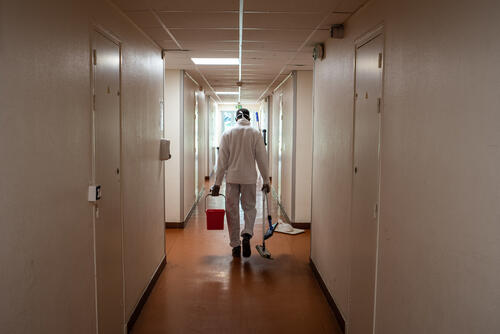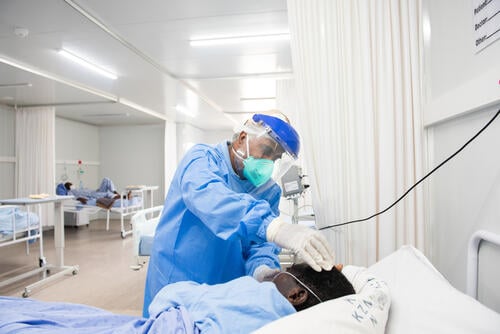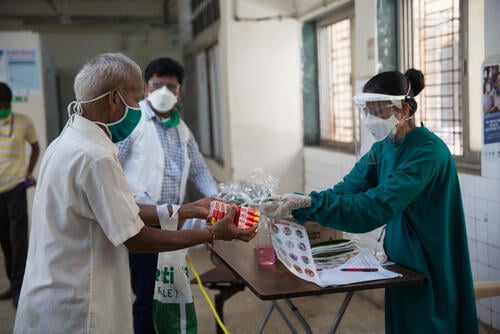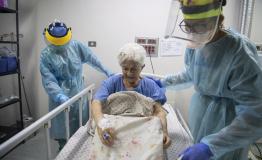More than 40,000 people have died as a result of COVID-19 in France since March 2020, including more than 12,500 in nursing and residential care homes. As a second wave of the new coronavirus spreads across the country, supporting care home workers already weakened by the first wave is becoming increasingly urgent. Additional support will enable them to provide the best possible care to residents.
Since April this year, significant progress has been made to help nursing homes cope with COVID-19, such as ensuring access to testing and being provided with personal protective equipment. Local health authorities and the management and staff of nursing homes are ready to respond to this second wave, while the French government, in a show of support, has announced plans to recruit 12,000 health workers for hospitals and nursing homes.
Staff shortage – and MSF’s appeal for help
However, in many homes there is a glaring shortage of staff, especially medical staff. More staff are needed to ensure residents receive dignified care adapted to their specific needs (whether they have COVID-19 or not), comply with health protocols, liaise with hospitals and, when necessary, provide palliative care.
As hospitals become increasingly overstretched, it is both vital and urgent that nursing homes be given the personnel they need to be able to give their residents the appropriate care.Olivia Gayraud, MSF nursing home programme coordinator
In response to the staff shortage, Médecins Sans Frontières (MSF) is launching an emergency appeal for medical and paramedical professionals to help care for dependent seniors in nursing and residential care homes, particularly in the Paris region.
“In some cases, this will involve expanding the delivery of nursing care, and in others, giving technical advice, for example, on how to contain the spread of infection or organise visits from families,” says Jean-Hervé Bradol, medical doctor for MSF’s programme in nursing homes. “We will continue to offer staff and residents psychological support, and when necessary, provide medical equipment so that patients with breathing difficulties can have access to oxygen therapy.”
“Although our programme will focus initially on nursing homes we’re already in contact with in the Paris area, we’re also exploring how we can extend our support to other regions,” says Bradol.

MSF supporting staff through traumatic experiences
MSF has been working in 56 nursing homes in France since April 2020. In July, we began offering training and discussion groups to help prevent mental health and social issues nursing home workers who had lived through the first wave of COVID-19. We also provide support with improving the wellness and mental healthcare for nursing home residents.
During our work, MSF has seen the sometimes-dire situations endured by residents and staff, often left to fend for themselves.
“The distress and exhaustion felt by some nursing home staff exacerbate the structural difficulties facing the nursing home sector,” says Olivia Gayraud, coordinator for MSF’s programme in nursing homes. “As hospitals become increasingly overstretched, it is both vital and urgent that nursing homes be given the personnel they need to be able to give their residents the appropriate care.”
Some staff fear that there will be a repeat of traumatic events that they experienced during the first wave – such as being unable to get sick residents admitted to hospital – due to the shortage of medical staff this time around.
Some care assistants have told our teams that during the first wave of the pandemic, they were left alone at night with just a telephone for support to manage complex medical cases they have no training for. Sometimes they witnessed, powerless to do anything, the agony of residents suffering from a lack of oxygen, while doing the best they can, without appropriate equipment, to alleviate residents’ pain.
“Manifestations of psychological trauma, anxiety, visual and auditory flashbacks, as well as physical pain, such as weight loss and sleep disorders, are examples of the after-effects we frequently hear of from nursing home workers we meet in the course of our work,” explains Marie Thomas, psychologist for MSF’s programme in nursing homes.
From April to June 2020, MSF supported 30 nursing homes housing more than 2,000 elderly people in Île de France, by providing medical care to residents, protective equipment and technical support, mainly in terms of infection control and prevention. In July 2020, a mental health support programme was launched in 34 nursing homes, including training and psychological support for care home workers. To date, 188 staff have benefited from it. MSF also assisted the elderly and staff working in nursing homes and long term care facilities in other countries such as Belgium, Italy, the United States and Spain.







